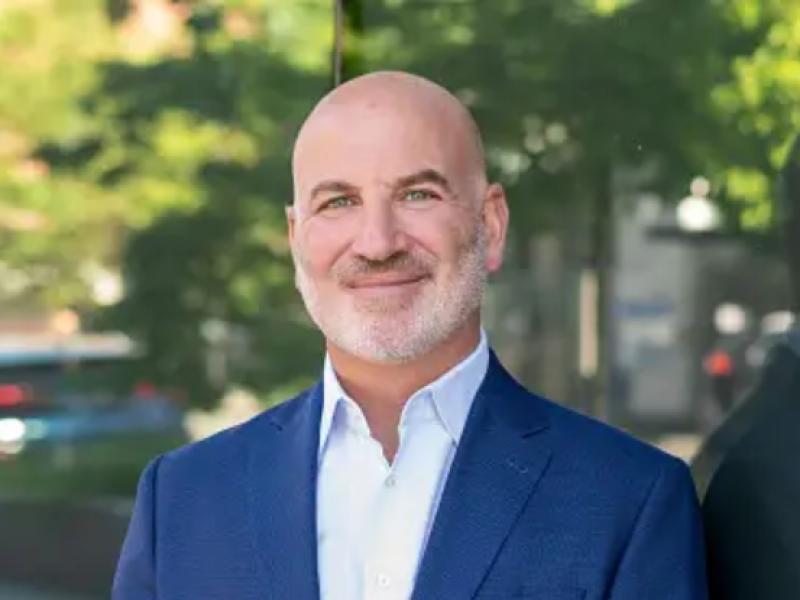
Ted Willcocks is global head of asset management, real estate, for Manulife. (Courtesy Manulife)
The COVID-19 pandemic is affecting commercial real estate investment in different ways in different areas of the world.
A May 6 Real Estate Forums webinar examined how, through the early days of the pandemic, major Canadian and international investors are adjusting portfolio and investment strategies. The panel was moderated by Brad Olsen, founder and president of Atlantic Partners, Ltd., who has been active in international real estate investment for more than 35 years.
The Cary, N.C.-headquartered firm was founded in 1995. It helps clients design and implement cross-border real estate strategies and is active in the United States, Germany, the United Kingdom and the Netherlands.
Olsen spoke to executives from five companies who signed in from different parts of the world.
Manulife Investment Management
Ted Willcocks is global head of asset management for real estate for Toronto-headquartered Manulife Investment Management, which invests in North America and Asia.
The global wealth and asset management segment of Manulife Financial Corporation has $956 billion (all figures Cdn, unless otherwise noted) in assets under management and administration globally.
Manulife has continued to be active with deals originated before the COVID-19 crisis. It closed on a $140-million logistics property in Wuhan, China, generally considered ground zero for COVID-19, a month ago.
Manulife’s Asian teams are now two months ahead of its North American teams as that part of the world was hit hard by the virus earlier and has started its recovery.
Willcocks sees great opportunities in Australia, Indonesia and Vietnam and expects to see Asian deals brought to the investment committee in the next quarter.
Manulife is selling properties in Tokyo and Willcocks said it has received solid bids.
Willcocks also expects to close its next deal in the U.S. logistics property sector late this quarter, or early in Q3.
Willcocks said Manulife has been examining its portfolio and trying to get a better handle on pricing, rent rolls and credit quality of assets when underwriting deals.
Bouwinvest Real Estate Investors
Stephen Tross is chief investment officer (CIO) of international investments for Amsterdam-headquartered Bouwinvest Real Estate Investors, one of the largest real estate investors in The Netherlands and a major international real estate investor.
It manages $18.5 billion in assets in five Dutch property sector funds and three international real estate investment mandates in Europe, North America and Asia-Pacific.
Bouwinvest just made a major investment in a Chinese logistics property in a deal that was in place before COVID-19 struck.
One of its strategies is to invest in key logistics assets in selected Chinese cities within four regions with attractive macro-economic fundamentals and strong supply and demand dynamics.
Tross said the Chinese logistics sector is growing, driven by continued urbanization, increasing disposable incomes and a rise in e-commerce.
Just four per cent of Chinese logistics facilities are professionally managed and with modern, international specifications, according to Tross. The supply of logistics land is restricted, which limits the risk of oversupply.
Bouwinvest may be able to take advantage of the financial damage COVID-19 has caused and Tross expects to close on its first such deal this quarter.
“A market correction creates interesting opportunities, because some parties get into financial distress or otherwise need liquidity. We are very well-funded and capitalized, so we still have money available to invest in all three regions.”
Twenty-five per cent of Bouwinvest’s international portfolio is in publicly listed real estate securities.
REITs have been recovering after unit values in the sector dropped by about 30 per cent in March, but Tross sees them as long-term investments and believes there may be purchase opportunities in undervalued logistics and housing REITs.
Bouinvest invests on behalf of more than 20 pension funds. Tross said the largest of those funds has historically made a large allocation to real estate and will continue to do so because it’s more stable and reliable than stock markets.
Netherlands multifamily assets comprise the biggest part of Bouwinvest’s portfolio and Tross said the large majority of tenants have paid rents as normal.
Bouwinvest’s pension fund investors advised it to be accommodating when dealing with tenants with rent payment problems, he said.
“They’re well aware that we need to come out of this crisis together, and they are giving us the leeway we need to act accordingly,” Tross said.
“We have agreed not to evict any tenants who cannot pay their rent during this period and we’re being flexible on deferrals. We have also decided to postpone the annual rent increases.”
Baring Private Equity Asia Real Estate
Mark Fogle is the Singapore-based managing director and head of real estate for Baring Private Equity Asia (BPEA), one of that continent’s largest independent private equity firms, with $28 billion worth of assets under management.
The company was established in 1997 and has offices in Hong Kong, China, India, Singapore, Australia and Japan.
BPEA Real Estate is an extension of the company and has invested more than $7.8 billion in 125 properties.
“We believe that China is recovering much faster than the rest of the region,” said Fogle, who noted the firm closed an acquisition on March 31 and had to do its due diligence virtually due to COVID-19 restrictions.
BPEA Real Estate believes in China, will continue to invest in Japan and is hoping to see activity in Australia, according to Fogle.
It will look at Singapore if it can enter at the right cycle, but he said the city-state has plenty of office development and retail has always been overbuilt in Asia.
Fogle said BPEA Real Estate’s first two funds have no exposure to the hospitality or retail asset classes outside of one 1,500-square-foot coffee shop. Its investment mix is approximately 60 per cent logistics, 25 per cent multifamily and 15 per cent office.
Fogle said some sellers’ expectations are above where his company thinks they should be, and the pandemic should lead to lower property valuations.
BNP Paribas Real Estate

Nathalie Charles is deputy CEO of BNP Paribas Real Estate in charge of investment management. (Courtesy BNP Paribas)
Nathalie Charles is deputy CEO in charge of investment management for Paris-headquartered BNP Paribas Real Estate, which manages $46 billion in European real estate on behalf of more than 200 institutional clients and more than 100,000 individual clients. It’s present in 32 countries, mainly in Europe.
BNP Paribas closed a deal in Europe at the end of March while the continent was essentially locked down.
It has remained active during the pandemic, Charles said. BNP Paribas looks at the specific fundamentals and upside when considering an acquisition, as opposed to shopping for a specific asset class or looking in a particular market.
BNP Paribas has a big presence in Paris, Frankfurt, Munich and Milan. Charles stressed the importance of having local teams because, despite being part of the European Union, governments in different countries have taken different measures during the pandemic applicable specifically to tenants.
She said there can also be regional differences within countries when it comes to dealing with landlord-tenant relationships.
There has been much pressure in some European countries regarding postponing rents for small businesses and retailers to support the economy and employment.
Charles said BNP Paribas is trying to balance these concerns with those of investors looking for quarterly returns and continued profits.
BNP Paribas is the third-largest real estate investor in Italy and will continue to be a major player there while also remaining active in Germany, according to Charles.
Union Investment Real Estate GmbH
Martin Brühl is the CIO and a member of the management board for Union Investment Real Estate GmbH. The Hamburg-based company is the largest German real estate investment manager and is active in multiple property sectors in Europe, Asia and the Americas.
Union has 381 properties worldwide valued at $66.4 billion.
The company signed a $305-million deal for a core office asset in Hamburg in early May that will be announced soon. Brühl said the investment committee will soon look over a large logistics deal in Germany.
“I think business will become more local for the foreseeable future because there are still travel restrictions, a fear of people crossing borders, and there can be an inability to access buildings,” said Brühl. “That is going to change the way we operate.”
Union’s ambitious growth plans, however, can only be achieved by investing outside of Germany. It has invested more than $1.5 billion in the U.S. in some years because of that market’s depth and liquidity.
Union has a market share of at least 30 per cent in the private open-ended fund business in Germany, according to Brühl.
It raised about $420 million in equity for a global fund in the midst of the COVID-19 crisis and has constant inflows of $70 million a month from investors.
“We currently have US$7 billion in liquidity, US$3 billion of which is dry powder to invest,” said Brühl. “The problem is to find the right deals.”







